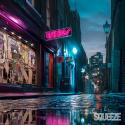I have little patience with those that link mental anguish with creativity, glamorising the former as if the latter were any consolation. That said, there is comfort to be drawn from songs that spin the blankness of depression into something desolate and beautiful. It’s why I’ve had “Night Still Comes”, the second track from Neko Case’s new album, on repeat for the past week: it slips in, hopeless and otherworldly after a typically strident album opener, and runs on unchecked like the internal monologue of the depressive. “Is it because I’m a girl?” Case muses, rhetorically. “If I puked up some sonnets, would you call me a miracle?” In the background echoey, discordant ay-ay-ahs set the scene, loading the song with the shiver of that inevitable, solitary night.
It’s no secret that on The Worse Things Get, Case has mostly abandoned the elegant mythologies that have previously so typified her songwriting and instead favoured something a little more direct - albeit no less beautiful. Of the two songs that most obviously capture the despair Case felt in the aftermath of a number of family deaths, “Where Did I Leave That Fire?” is the more otherworldly, musically; yet the more immediate, lyrically. “I wanted so badly not to be me,” Case sings, her voice ragged with emotion, before the song speeds up to demonstrate a little of the ferocity and humour her voice also carries so well.
There’s room for both sides of Case on the album: from the urgency of strident single “Man” with its playful, gender-bending lyrics to the dreamy reminisce of “Calling Cards”. The album’s mid-point, “Nearly Midnight, Honolulu”, is a stylistic departure both in its sparse, a cappella delivery and its unadorned retelling of a verbal attack Case witnessed one night by a mother on her young daughter. Drawing parallels with her own troubled childhood, Case counsels the girl that the darkness will one day lift: as, indeed, it does by the album’s tumultuous closer “Ragtime”. “Cover the shades and erase the day,” she sings, her spirits saved by ragtime jazz and the soaring trumpets of the song’s chorus. “I’ll reveal myself when I’m ready, I’ll reveal myself invincible soon.”
Take a listen to "Night Still Comes" overleaf















Add comment